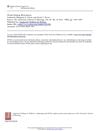 January 2004 in “Dermatologic Surgery”
January 2004 in “Dermatologic Surgery” Storing hair follicles in a special buffer with certain inhibitors can increase hair growth and improve transplant results.
 September 2010 in “Advances in Dermatology and Allergology/Postępy Dermatologii i Alergologii”
September 2010 in “Advances in Dermatology and Allergology/Postępy Dermatologii i Alergologii” TrichoScan is reliable for counting and measuring hair density but may not accurately assess hair types in women with hair loss.
 April 2021 in “IntechOpen eBooks”
April 2021 in “IntechOpen eBooks” Androgens, male hormones, affect physical and mental functions, with a decrease leading to health issues like muscle loss, bone disease, and depression, and more research is needed on long-term effects and treatments.
February 2023 in “Pharmaceutics” 365 citations,
November 2018 in “Journal of Allergy and Clinical Immunology” People with atopic dermatitis have different skin bacteria, and targeting these bacteria might help treat the condition.
181 citations,
December 2017 in “Trends in immunology” Intestinal intraepithelial lymphocytes are crucial for gut immunity and maintaining the mucosal barrier.
91 citations,
January 2010 in “Journal of Allergy and Clinical Immunology” NK cells play a role in skin diseases like eczema and psoriasis.
61 citations,
October 2011 in “Experimental dermatology” Scalp itching is common and hard to diagnose due to the complex nerve structure of the scalp.
57 citations,
April 2009 in “Differentiation” SDF-1/CXCL12 and its receptor CXCR4 are crucial for melanocyte movement in mouse hair follicles.
 54 citations,
January 2023 in “Signal Transduction and Targeted Therapy”
54 citations,
January 2023 in “Signal Transduction and Targeted Therapy” New therapies are being developed that target integrin pathways to treat various diseases.
 29 citations,
December 2019 in “Transfusion and Apheresis Science”
29 citations,
December 2019 in “Transfusion and Apheresis Science” Platelet-derived bio-products help in wound healing and tissue regeneration but lack standardized methods, and their use in medicine is growing.
 29 citations,
April 2019 in “Acta neuropathologica communications”
29 citations,
April 2019 in “Acta neuropathologica communications” Stopping mitochondrial respiration can prevent brain cancer spread in skin cancer patients, and plant compound β-sitosterol could help achieve this.
26 citations,
April 2006 in “Cephalalgia” Botulinum A toxin injections reduced pain and promoted hair regrowth in a woman with a rare form of alopecia areata.
 11 citations,
October 2021 in “Stem Cell Research & Therapy”
11 citations,
October 2021 in “Stem Cell Research & Therapy” Hair follicle stem cells reduced hair loss and inflammation in mice with a condition similar to human alopecia.
 9 citations,
March 2022 in “Frontiers in Immunology”
9 citations,
March 2022 in “Frontiers in Immunology” Foxp3+ Regulatory T Cells are important for immunity and tolerance, affect hair growth and wound healing, and their dysfunction can contribute to obesity-related diseases and other health issues.
7 citations,
July 2021 in “The journal of investigative dermatology/Journal of investigative dermatology” Human skin can be reconnected to nerves using stem cells, which may help with skin health and healing.
 3 citations,
February 2023 in “International Journal of Molecular Sciences”
3 citations,
February 2023 in “International Journal of Molecular Sciences” Autologous Platelet and Extracellular Vesicle-Rich Plasma (PVRP) has potential in enhancing tissue regeneration and improving hair conditions, but its effectiveness varies due to individual differences.
 2 citations,
November 2023 in “Bioactive materials”
2 citations,
November 2023 in “Bioactive materials” New method improves copper peptide delivery for hair growth three times better than current options.
 2 citations,
June 2022 in “Cosmoderma”
2 citations,
June 2022 in “Cosmoderma” Regenerative medicine shows promise for improving hair and skin but needs more research for standard use.
 1 citations,
February 2023 in “Drug Design Development and Therapy”
1 citations,
February 2023 in “Drug Design Development and Therapy” Plant adaptogens may help treat skin diseases and improve skin health, but more research is needed to fully understand how they work.
 May 2024 in “International Journal of Nanomedicine”
May 2024 in “International Journal of Nanomedicine” Biodegradable polymers can improve cannabinoid delivery but need more clinical trials.
 September 2023 in “JPRAS Open”
September 2023 in “JPRAS Open” Botulinum Toxin A may help with hair growth and has some side effects; more research is needed.
 October 1982 in “American Journal of Nursing”
October 1982 in “American Journal of Nursing” Wound healing is a complex process involving different cells and stages, leading to scar tissue formation and strength increase over time.
 24 citations,
January 2001 in “Dermatologic clinics”
24 citations,
January 2001 in “Dermatologic clinics” Hormonal therapy is a treatment option for acne, the only medical treatment for hirsutism, and the most promising for androgenetic alopecia.
 30 citations,
April 1997 in “European journal of endocrinology”
30 citations,
April 1997 in “European journal of endocrinology” The document concludes that managing hirsutism involves identifying the cause, using a scoring system for severity, combining cosmetic and medical treatments, encouraging weight loss, and providing psychological support, while noting the need for more research on drug treatments.
 24 citations,
January 2003 in “Journal of Investigative Dermatology”
24 citations,
January 2003 in “Journal of Investigative Dermatology” Blocking a specific receptor slows down hair loss in mice.
 5 citations,
December 2011 in “Drug Research”
5 citations,
December 2011 in “Drug Research” CB-03-01 is a promising skin cream for treating hormone-related skin problems without causing harmful body-wide effects.
 3 citations,
January 2017 in “Yonsei Medical Journal”
3 citations,
January 2017 in “Yonsei Medical Journal” Blocking 11β-HSD1 can lessen the harmful effects of glucocorticoids on hair growth cells.
 2 citations,
April 2013 in “Expert Review of Endocrinology & Metabolism”
2 citations,
April 2013 in “Expert Review of Endocrinology & Metabolism” Identifying nonclassic congenital adrenal hyperplasia and carriers of CYP21 mutations is challenging, and genetic counseling is recommended due to their prevalence.
 1744 citations,
August 2006 in “The Journal of Clinical Endocrinology and Metabolism”
1744 citations,
August 2006 in “The Journal of Clinical Endocrinology and Metabolism” Polycystic Ovary Syndrome should be seen mainly as a condition of excess male hormones, with a focus on this in its definition.






















